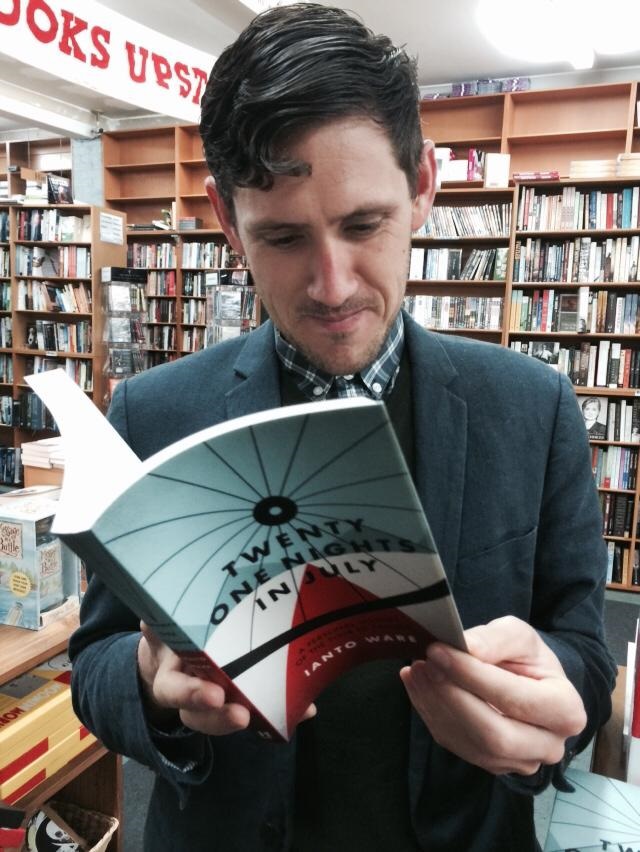In 2008, writer and Renew Adelaide founder Ianto Ware sought escape from the mountains of reading in his day job by leaping into the shared hobby of chronic insomniacs and cycling enthusiasts all around Australia: SBS’ late-night coverage of the Tour de France. Six years later, Ware returns to Adelaide to launch his “metaphysical” history of the tour Twenty One Nights In July having finally experienced the greatest race in the flesh.
Recent years have seen Ware’s knack for licensing regulation and planning policy achieve national renown as the first National Live Music Coordinator appointed by then Arts Minister Simon Crean in 2012 to address the dearth of live music venues nation wide. Now, Hunter Publishers has dusted off, transcribed and republished Ware’s self-released 2009 zine. A far cry from the smudgy photocopier ink and hand-drawn diagrams of its initial run, the final manuscript submitted for publication underwent heavy revision by Ware in the transition from Xerox to bookshelf.
“It’s almost a complete re-write,” Ware explained. “The original was a 30,000 word critical analysis of the 2008 Tour de France, where as this looks at twenty one of the finest ever Tour stages in twice as many words.” While the scope of the book has changed, the tone has also matured a little. “When I started talking to the publisher it was suggested I remove what he politely referred to as the ‘sophomore humour’, Ware says.”I took this to mean remove all the humour and replace it with more facts.”
Even with the balance of jokes and facts now tipped in the latter direction it remains a witty read, although at times the eccentricities of the sport’s more over the top competitors require little comic licence. With the revelation of Lance Armstrong’s doping in 2012, hindsight provides Ware with new cause to assess and lampoon the more “cartoonish” superhuman feats of Armstrong, Floyd Landis and their fellow dopers.
“I think everyone knew Armstrong was doping, except those who wilfully chose to believe otherwise,” Ware contends. “I remember when the Adelaide City Council gave him the keys to the city whilst he was under investigation by US federal authorities. That was pretty outlandish. The thing I find fascinating wasn’t so much what happened after he was caught as the psychology that let him get away with it for so long.”
Tracing through the Tour’s history, Ware explores the race’s origins as a ploy by French cycling magazine L’Auto to shift units. As the trials and contests of the early athletes were filtered through the lyrical – and often hyperbolic – pen of sales-oriented journalists, the Tour has always lent itself to a larger-than-life mythos. Despite television changing how viewers engage with the race, for Ware the Tour’s potential for grand metaphor is a feature that still resonates strongly, with the doping scandals of recent decades a perfect example.
“Metaphorically, I think that’s quite a rich topic; the degree to which people will justify believing in things that are obviously false or morally corrupt, and what sustains that sentiment,” he explains. “With Armstrong I can see how the fairy tale was appealing. I suppose you can see the same sentiment played out in the belief systems that justify other obvious falsities.”

On the cusp of the book’s release Ware also took the opportunity to make the ultimate pilgrimage for any cycling fan: experiencing the Tour in the flesh. “It’s even more grandiose in real life,” Ware recalls. “I went to the stage finish in London, which was the largest public spectacle I’ve ever seen, and later went to the stage start in Ypres and was surrounded by screaming Belgians. I had fairly big and utopian dreams about what it would be like to see the Tour, and they were all fulfilled,” he said.
Currently calling Sydney home, Ware has seen firsthand the media-stoked backlash against the city’s cyclists and bike-friendly Lord Mayor Clover Moore on a scale much more vitriolic than the response to our recently-unveiled Frome Bikeway. “It’s almost funny how those guys get so upset about a few bike lanes,” Ware reflects. “I read an article in which the writer survived a near death incident, only to then have the motorist drive alongside next to him screaming out threats to phone Ray Hadley. I’m not sure what Ray Hadley was going to do, but when I hear those sorts of opinions it seems like there’s a real investment in this vision of the world I really don’t understand,” he explains.
While Sydney’s embattled bike lanes might make his hometown seem tranquil by comparison, Ware can still see room for improvement in Adelaide. “I think there’s a tendency in Adelaide to assume a token gesture makes for a problem solved, particularly at the local government level,” he says. “It’s nice there’s a bike lane down Frome Road, but try riding out to Gepps Cross and you can see the problem is still there.”
With the recent announcement of the State Government’s “citizen’s jury” initiative to brainstorm ways to mend relations between South Australian motorists and cyclists, Ware may have a point. But with this new book featured prominently on bookshelves across the country, perhaps the guide to a lasting détente on our roads and bike paths has already been written. Or, as Ware might argue, spending twenty-one sleep deprived nights parked in front of the television can’t hurt either.
Twenty One Nights in July (Hunter Publishers) will be launched at Format Festival Presents: DIY Market at Hello, Yes, 12 Eliza St on Sunday, October 5, 4.30pm
Get the latest from The Adelaide Review in your inbox
Get the latest from The Adelaide Review in your inbox